It’s coming – can you feel it? That looming dread: a whole summer during which you are expected to be Super Parent. Six weeks to fill with entertaining, educational activities for your children, while juggling work, not spending a fortune and trying to find a bit of time for yourself as well.
While I can’t promise to completely solve your summer holiday dilemmas, I can offer some advice and tips, as road-tested by real parents. So, dust off that bucket and spade, pull up a deckchair and dive in.
The best activities to keep your children entertained during the school holidays
Ready, steady, bake!
Cooking with kids teaches them how food is made and helps them understand nutrition. It might even take the pressure off you, too. It can be messy, sure – but that’s part of the fun. Start with easy tasks such as scones and cupcakes, and then move on to pizzas, sandwiches and pasta. Make meals where they have choices – jacket potatoes and wraps are ideal – so your child can choose their own fillings. Don’t forget that they can be taught the importance of washing-up and tidying away, too, especially as they get older. There are some excellent kids’ recipe ideas on Jamie Oliver’s website and Good Food.

Kids’ apron
£9.34 at Debenhams
£10.99 at B&Q
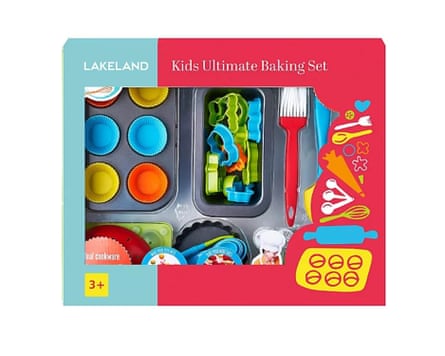
Kids’ baking set
£29.99 at Lakeland
£29.99 at Amazon
Arty, crafty and messy
Most of us have a drawerful of art supplies, so tip them out and let kids get creative. A roll of wallpaper makes a great canvas for potato stencils, hand prints or finger painting. Collect toilet roll tubes and egg boxes for Blue Peter-style craft projects; there are lots of ideas at Hobbycraft. For messy or sensory play (on a wipe-clean surface of course!), use everyday ingredients such as sand, rice, homemade play dough and papier mache, water and even mud. You might want to invest in a garden mud kitchen, such as this one from Janod, complete with pots to inspire little chefs. Sensory play can be particularly important for children with additional needs and early years education, as it engages all the senses.

Children’s play sand, 15kg

Janod mud kitchen

Mud kitchen
Never bored with board games
Ideal for lazy and wet days, these can be enjoyed by all. Look for age-appropriate games and get stuck in – the noisier and more frenetic, the better. Bonus points for teaching skills such as counting and recognising shapes and colours, and for games that can be played without adult supervision. Blokus is a board game for ages seven and up where your child must get as many of their coloured blocks on to the board as possible, using their cunning to block other players. Combining building and gaming skills, Lego Monkey Palace can be played by children over 10, and it exercises their creativity, as they can build the set in different ways.
Card games are fun too, and have the advantage of being small, so you can take them out with you. For four years and up, Remember, Remember is a matching game that encourages memory and observation. And for kids over seven, this Tom Gates card games set has two games that develop their counting and strategy skills – it can even be played in the car or on a train. If you’re out of the house but have a tablet, the BBC has lots of free CBeebies games for children, and there are plenty of free games on Google Play for keeping kids entertained at the airport.

Blokus

Lego Monkey Palace

Remember, Remember

Tom Gates card games set
£4.99 at Zatu Games
£7.99 at Stanfords
Making memories
Buy a cheap scrapbook and use it to record memories. Stick in souvenirs: we used to include bus and train tickets, sweet packets, museum leaflets, things we found, pressed flowers, postcards – anything to remind us of places we visited. The children can write their memories around the objects, and you can print and stick in photos, too. These are lovely to look back at in later years.
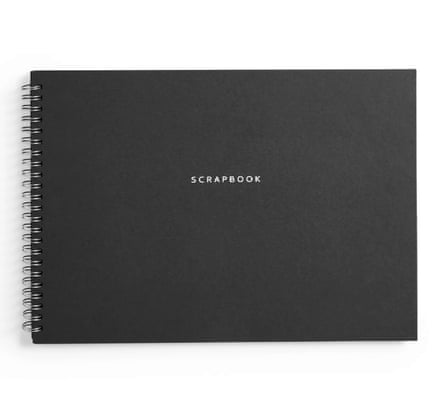
Black spiral-bound scrapbook

DIY scrapbook kit
£8 at Marks & Spencer
£8 at the Entertainer
If you go down to the woods today …
Days out don’t have to be expensive or require Nasa-level planning. Pack a picnic, a few toys and a blanket and head to a local forest. Take a long, slow ramble and allow your children to enjoy nature. Liat Hughes Joshi, author of 5-Minute Parenting Fixes, says: “I am a huge fan of encouraging children to notice nature. Depending on where you live, just point out things around them.” Once you’ve had a walk, have a teddy bear’s picnic.

Picnic blanket
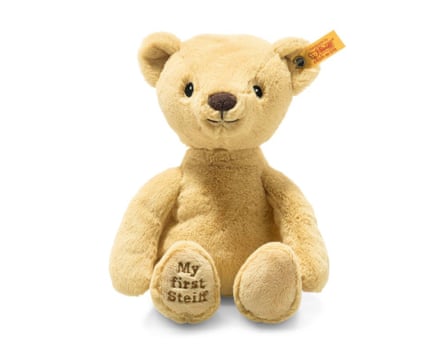
My First Steiff teddy bear
£29.89 at Hamleys
£29.90 at John Lewis

The Filter’s favourite cool bag: Quechua cooler backpack 100
£24.99 at Decathlon
£25 at Argos
For more, read our guide to the best cool boxes and bags
Make ’em sing, make ’em dance
Sign up the kids for a sports, dance or acting club – one or two mornings a week for younger children, a week-long course for older ones. Some are affordable or free – check Tennis for Free and Junior parkrun. Search your local council and “free summer activities”; a quick look at mine shows swims for £1, football, tennis, acting, table tennis, badminton and cycling. Holiday activities and food is a scheme for those eligible for free school meals and has plenty to offer. Most councils also have activities for children aged 11-19 years.
Down in the den
We all loved making dens when we were kids, and this can be done in the house or garden. Create one from blankets and sheets draped over tables or chairs, fill it with cushions and toys and let the kids hang out inside it. You can use a tent or a tipi too – solar fairy lights complete the cuteness – or invest in this Thule shade that attaches to the buggy. If you’re brave, you could all sleep in the den overnight.
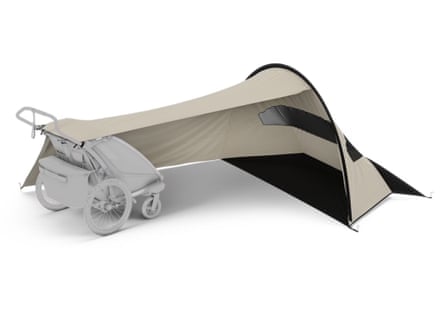
Sun and wind tarp

Nobodinoz Arizona Vibes tipi
£135.96 at Scandiborn
£183.20 at Not on the High Street
Splish splash
It looks as if we are in for a scorchio summer, so it might be time to get a paddling pool; there are lots of inexpensive ones. Once installed, your kids can cool down and play games in it. Babies and toddlers can use cups, buckets and colanders to learn how water flows; older children can use bath toys or go crazy with water pistols. Just make sure you never leave children unsupervised with a pool – and slather them in waterproof SPF.

Swim Essentials inflatable rainbow paddling pool

Funsicle dinosaur pool play set with slide
Reading list
Don’t forget one of the best free resources for you and your kids – your local library. Not only can they borrow books, but also DVDs and audiobooks. Some offer holiday activities and, as a bonus, they’re great for meeting other families.
Day tripper
Plan “proper” days out, but keep them to once a week at most. Any more than that will get expensive and won’t feel as special. If you’re going away for a week or two, that leaves just four or five to plan. Pick a destination that has plenty for kids and that is a manageable distance from you – you don’t want to spend the day travelling. Here are a few ideas:
-
Visit a farm, petting zoo or animal sanctuary to help your children learn about the animals, what they eat and how they’re cared for.
-
Museums are mostly free and have activities for kids. Don’t neglect small, specialist museums – some of the best are those with a tight focus, such as packaging, medicine or musical instruments. Search for those near you on this museums website.
-
For a special outing, visit a theme park, amusement park or stately home and get special offers from Kids Pass, which offers deals on activities, meals, cinema tickets and more.
-
Take in a stately home or garden with English Heritage or the National Trust and see what fun they put on for children. Annual memberships can mean you save in the long run.
Garden games
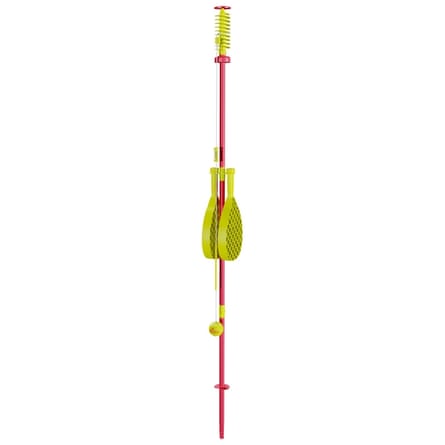
Swingball
The OG of garden games, Swingball has been around since the late 1960s. Some have water-filled bases, but we prefer the old-fashioned type with a spike to keep it in the ground. No lost balls, and your kids can even play it alone.
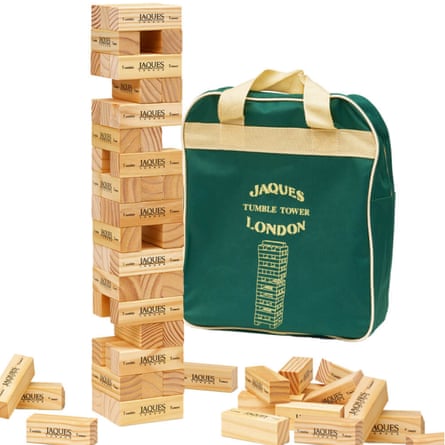
Giant tumble tower
Children just love building things and knocking them down. This set of giant wooden blocks can be used by very young children to learn balancing and building skills. As they grow, they can start to play Jenga, pulling out one block at a time from the tower.
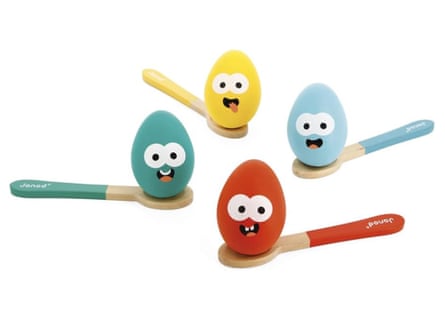
Janod egg and spoon set
Encouraging the kids to run around is the ideal way to ensure they’re tired at bedtime. This cute, retro egg-and-spoon race set is for four players and helps your child develop their hand-eye coordination, balance skills – and a competitive streak! Use it as part of a retro sports day, with three-legged races and wheelbarrows.
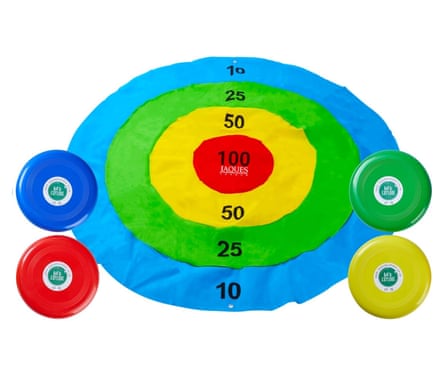
Target game
This colourful garden game is made from weatherproof materials and is quick and easy to set up and use. It’s suitable for kids aged three and up and will help them learn throwing skills, along with discovering how to judge distance.

Petanque set
£25.99 at Robert Dyas
£30.99 at John Lewis
You can play this in the garden or your local park (some have boules and petanque areas) or even take it with you on holiday. Comprising six metal balls, a measuring tape and a jack, it comes in a neat storage bag.
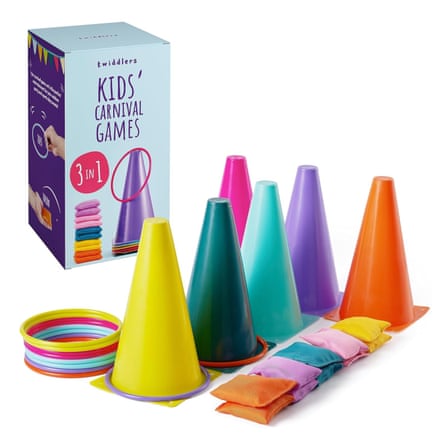
Carnival games set
This set offers lots of possibilities and can be used in different and creative ways. Toss the rings over the colourful cones; play hopscotch with the beanbags; make an obstacle course; play a throwing game. Great for hand-eye coordination, motor skills and creative play.

Giant four in a row
One of the favourite kids’ games has gone large and can be played in the garden. This set comes with 42 large counters and a giant frame. Slot them in one at a time, and the winner is the one who gets four in a row. It can be used indoors, too, if you have the space.

Ring toss game
This flamingo-themed game helps kids learn how to throw and catch – with their head! Toss the coloured rings on to the pink birds’ beaks and see who can get the most. You can also place all the flamingos into your paddling pool and help your little one throw from the side.
Top parenting tips for a successful summer
Let them get bored. Kids like having some downtime, as school days are long and busy. Joshi agrees: “Boredom is rare in modern childhood, because it’s easy to shove a device into a child’s hand – as if we’re afraid of letting them be bored. Research suggests that boredom could lead to creative thinking. Make sure they have toys that can be used in lots of creative ways and are not finite; my favourite is a big tub of Lego bricks.”
Divide up their day. There’s a reason why school days are divided into times for learning, eating and play – it helps to structure the day, and kids get a rounded day of education and physical exercise, as well as some time off. Try to mimic these parts of the school day, as kids love routine and feel calmer when they know what to expect.
Make sure they’re well rested. While it’s tempting to allow your kids to sleep late in the morning and go to bed late, routine is still important. Certified baby, child and autism sleep coach Kirsty Dawson of the Child Sleep Therapist says: “While it’s normal for routines to shift slightly during the summer, maintaining a consistent bedtime and wake-up time helps your child stay well rested, regulates their mood and prevents bedtime struggles or disturbed nights. A predictable sleep schedule supports their natural body clock, making it easier for them to fall asleep and stay asleep.” She continues: “A regular bedtime ensures you get your evenings back, too. In the last two weeks of the holidays, gradually shift back to school-time sleep routines.”
Avoid meltdowns. You’ve booked a big day out and, in the middle of it all, your two-year-old throws a tantrum in the cafeteria queue. “Look out for basic needs; they may be hungry, tired or thirsty, so make sure you’ve packed snacks and water,” says Joshi. “Take a break and have some quiet time. Get down to your child’s level and be a calming influence. If they’re really disturbing people, such as in a packed restaurant, take them outside.”
Plan mutual play dates. Don’t forget most parents at your kids’ school are in the same position, so set up some swaps. This can help you get on with work, and you’ll find they might play better with friends.
Sidestep sibling rivalry. It’s easy for one child to feel left out, especially if they have a sibling who appears to be getting more attention. Joshi suggests: “Try not to compare your kids overtly; don’t allow one to be labelled as ‘the naughty one’ or ‘the good one’. It helps to allow your child time alone with you and your co-parent, if you have one. Set ground rules when they’re old enough to understand them, such as not being allowed to take the other’s toy and no hitting.”
Sally J Hall is a parenting and health journalist, writing about everything from pregnancy and childbirth to babies’ development and the UK toy and nursery industry. She’s also brought up two children, now in their 20s, and entertained them during the holidays while working from home (yes, even back then). A former editor of two of the UK’s biggest parenting websites and a contributor to many more, she is passionate about helping parents avoid expensive mistakes and has reviewed everything from cribs and pushchairs to nappies

 3 months ago
59
3 months ago
59

















































